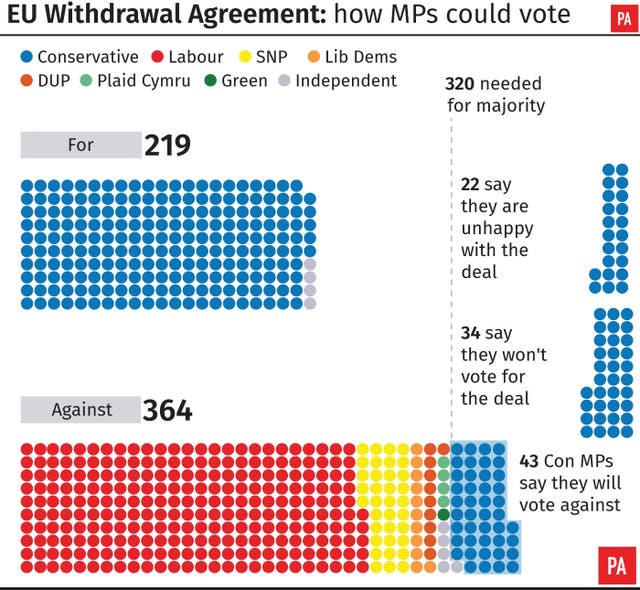Gove warns on risks of reopening talks as he insists Brexit vote will go ahead
The Environment Secretary said renegotiating opened the door to other changes that might ‘not necessarily be to our advantage’.

Michael Gove has insisted the Brexit deal vote will go ahead on Tuesday, warning Tory rebels that while Theresa May could win extra concessions from Brussels, reopening talks risks making it worse.
The Environment Secretary said “the vote is going ahead” as speculation mounted that the vote on the Withdrawal Agreement could be postponed or scrapped in the face of an open revolt by Conservative MPs.
He spoke as the European Court of Justice ruled that Britain could unilaterally revoke Article 50 of the Lisbon Treaty and remain in the European Union without having to seek approval from Brussels.
The ruling came as Mrs May’s leadership came under ever more intense pressure as MPs return to Westminster ahead of Tuesday’s Brexit showdown.
Mr Gove told Today that if there was more that can be secured to provide MPs with “reassurance that this is the right deal” then there was “no-one better placed” than Mrs May to get additional concessions.
But he said he was concerned that renegotiating the Withdrawal Agreement could lead to other EU countries changing it “in a way that may not necessarily be to our advantage”, adding: “By reopening it, there is a risk that we may not necessarily get everything that we wish for.”
As several senior members of the Cabinet were reported to be manoeuvring to replace Mrs May should the vote fail, Mr Gove said it was “extremely unlikely” that he would stand as a future Conservative Party leader.
The Prime Minister’s political future appears uncertain if she loses – but her credibility would also suffer a serious blow if she attempts to postpone the Commons vote.
Downing Street insisted the vote would go ahead as planned on Tuesday and Brexit Secretary Stephen Barclay said it was “100% happening”.

Foreign Secretary Jeremy Hunt said that while parts of Mrs May’s deal were unpopular with various factions, it “can be a stepping stone to delivering everything that people voted for”.
Arriving in Brussels for the Foreign Affairs Council he said: “The people who are minded not to vote for it have to go back and ask themselves what is their alternative?
“And if they don’t have a good plan, what are they risking?”
Debate on the plan will resume in the Commons on Monday, and Mrs May was warned not to give MPs the impression she lacks “appetite for the fight”.
Calls to European Council president Donald Tusk and Ireland’s Taoiseach Leo Varadkar on Sunday prompted speculation that efforts to find a way of reassuring backbenchers over the backstop – contingency measures aimed at preventing a hard border on the island of Ireland – were ongoing.
Downing Street did not publicise either call but insisted the conversation with Mr Tusk was a routine discussion ahead of Thursday’s summit of EU leaders in Brussels.
Irish foreign minister Simon Coveney dampened hopes of reopening negotiations, saying on Monday the deal agreed with the EU “is not going to change, particularly the legal language of the withdrawal treaty”.
Arriving in Brussels, he hit out at some of the rhetoric coming from Westminster, saying: “The backstop was never, and is not, an offer from one side to the other.”
He added: “Unfortunately a lot of the commentary, which has been emotive and inaccurate in relation to the backstop coming out of Westminster, has created the backstop as something that it’s not.
“This is simply an insurance mechanism that kicks in if all else fails to protect peace and stable relations on the island of Ireland and that is the way it should be seen.”
Northern Ireland Secretary Karen Bradley issued a plea to move on from the bitter Brexit rows, highlighting the benefits of the peace process as an example of what happens when “division can be overcome”.
But the splits in the Tory ranks appeared even deeper after three former ministers – Boris Johnson, Esther McVey and Dominic Raab – publicly failed to rule out leadership bids when asked on Sunday.
The sense of crisis has heightened expectations that the 48 letters required to trigger a confidence vote could be submitted to the Tory backbench 1922 Committee this week.
The Times reported that Home Secretary Sajid Javid and Foreign Secretary Jeremy Hunt are sounding out possible supporters.
Meanwhile International Development Secretary Penny Mordaunt is reportedly considering her position over the Brexit plan – she has so far failed to publicly back the Withdrawal Agreement, although she has voiced support for the Prime Minister.
The Daily Telegraph reported that Chief Whip Julian Smith was now among ministers urging Mrs May to postpone the vote – he had previously admitted he faced an “uphill challenge” to win round potential rebels.
Labour leader Jeremy Corbyn told ITV News that pulling the vote would be a sign of “absolute desperation” by Mrs May.
Labour will discuss how to respond to a defeat for Mrs May with other opposition parties at Westminster.
One option said to be under consideration would be a motion of no confidence in Mrs May personally – something that is thought to be more likely to gain support from Conservative rebels than a motion of no confidence in the government which could bring down the Tory administration.





